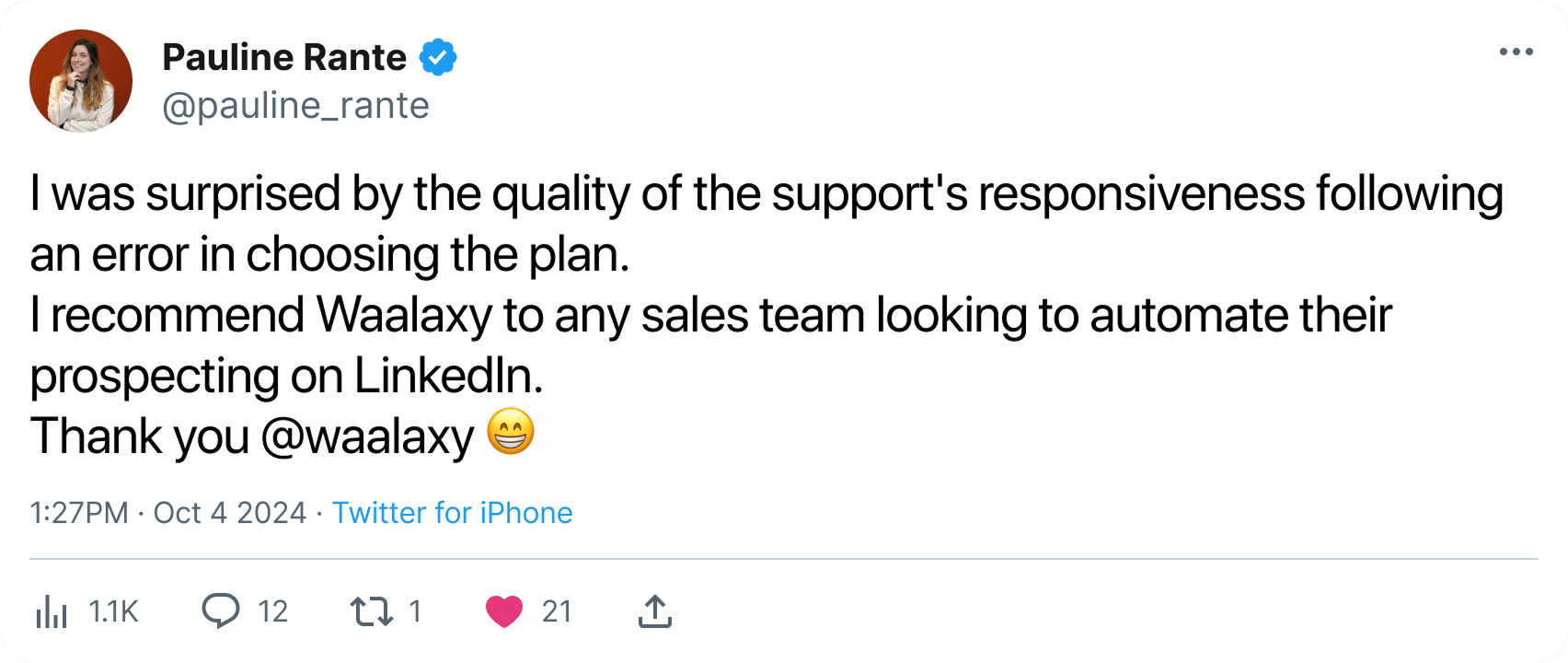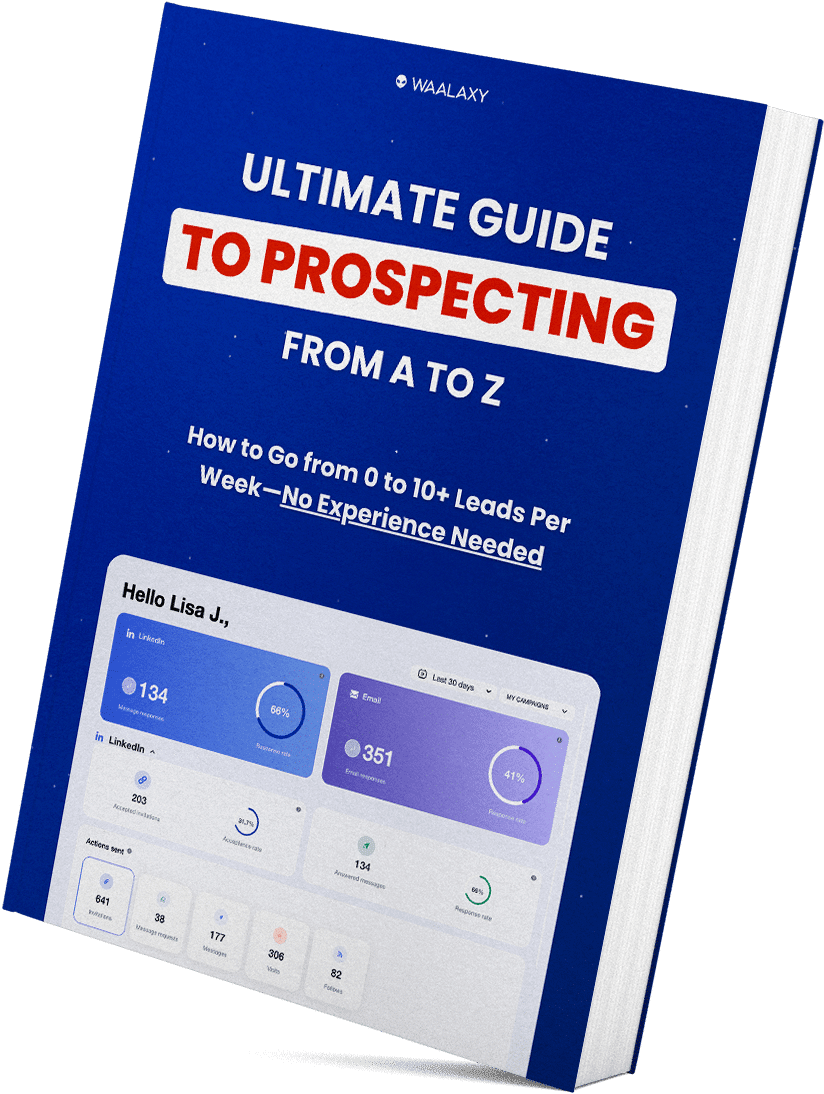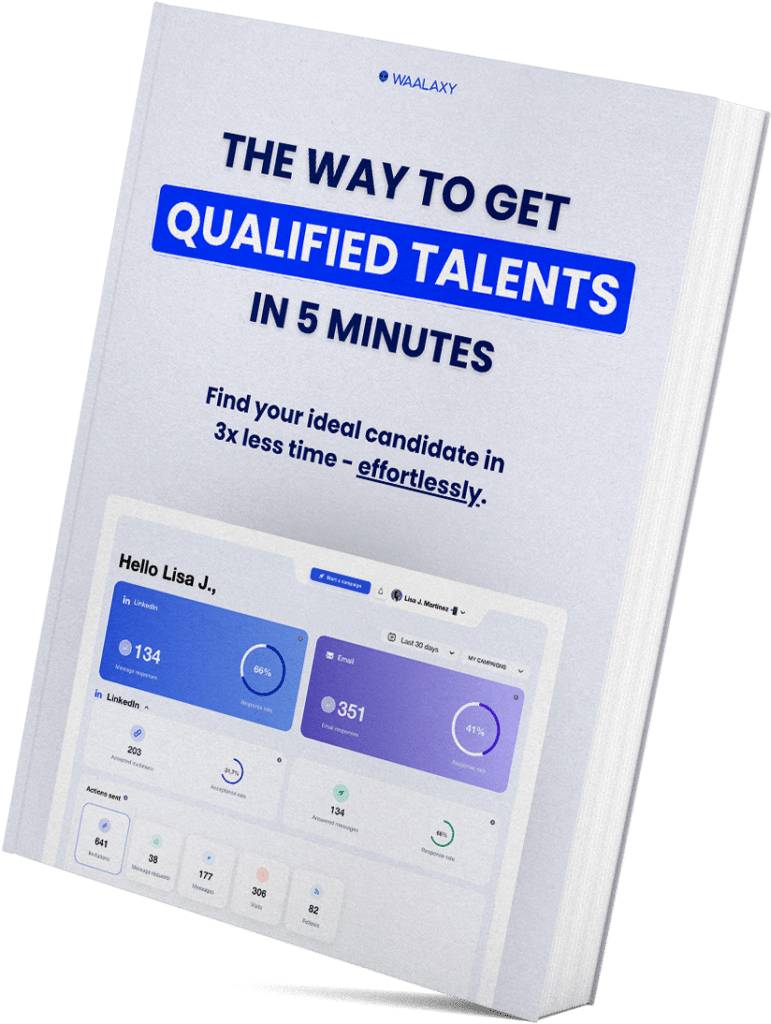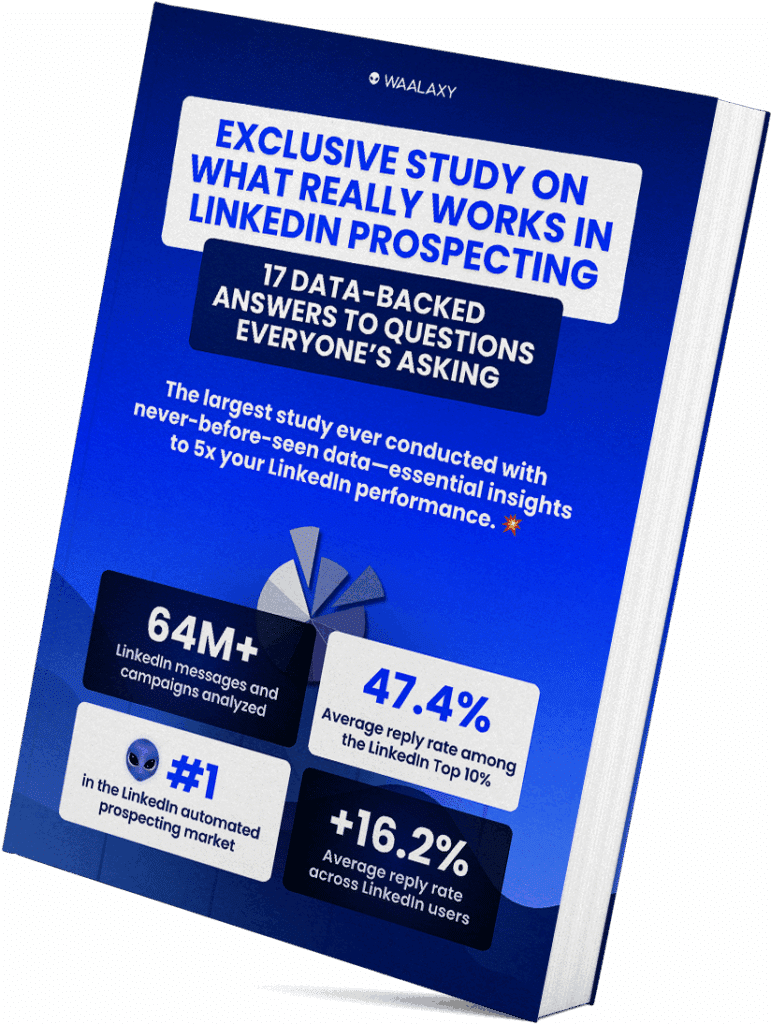- Sales Funnel: Definition
- What are the 4 stages of the sales funnel?
- Why make a good sales funnel?
- How to create an expert sales funnel?
- How to create a free sales funnel?
- How to calculate your sales funnel
- Use Waalaxy to optimize the performance of your automated sales funnel
- Conclusion – What is a sales funnel?
Having one in your business is certainly the most valuable asset. No more sales efforts to get customers, develop an automated Sales Funnel. 🚀 Today, we’re going to discuss this. Are you guys ready?
We are too, let’s go! 🏎️
As you may know, with the 100 connection request limit per week on LinkedIn, generating leads has become more complex.
But now, with Waalaxy, you can leverage the power of LinkedIn and emailing to generate more visitors in your Sales Funnel. Now, let’s find out together what you can do with an automated sales funnel. 😉
With an automated system you can:
- Save time.
- Generate more b2b or b2c prospects (or leads).
- Find new customers for your products/services.
- Collect payments 24/7.
- Educate a target audience on a topic related to your theme.
In this article, we’ll look at how to create an effective sales funnel that runs on autopilot and boosts your sales. Ready to go? Let’s start with a first question…
Sales Funnel: Definition
What is a sales funnel?
An automated sales funnel (also called “conversion funnel”) is a sales process that allows you to take a simple visitor to become a loyal customer, by going through several phases.
That’s a pretty simple definition, but we’ll go into more depth in the next part. ⬇️
What are the 4 stages of the sales funnel?
A sales funnel allows you to accompany the Internet user through the purchasing process.
It allows you to do lead nurturing, i.e., to help them find information and answer their questions so that they end up buying the product.
This funnel has 4 stages: Visibility/Awareness, Interest/Consideration, Decision, Retention.
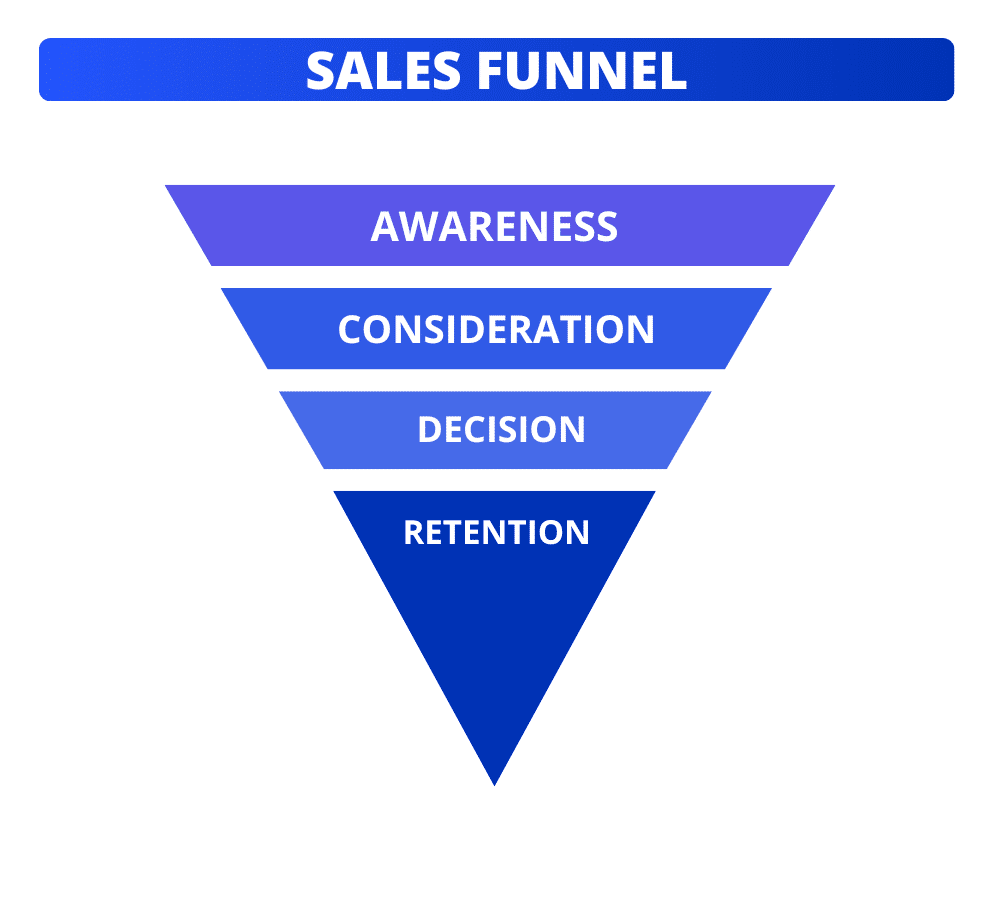
1. Visibility (or “awareness”)
Make yourself known to your target audience. 🎯
In the “visibility” phase, your role is to create an imprint with your brand in the prospect’s mind. This can be your personal brand (personal branding) with your services, or your professional brand (professional branding) for your products.
The prospect must be aware that your solution exists on the market. They must know the name of your brand. To create awareness, you must :
- Have a strong presence on social networks (and especially those of your target) with a professional account, you can post every week on LinkedIn, Instagram, Twitter…
- Create links with other brands : partnerships, sponsors, events, webinars, live YouTube…
- Advertise : You can also advertise on social networks, or directly on Google with Google Ads.
- Use SEO strategy : Create relevant articles about your expertise and products and follow the SEO rules to gain positions on Google.
2. The interest (or “consideration”)
In the “consideration” phase, the goal is to make your prospect want to know more. To be interested in it. And to do that, you need to generate:
- Interest in your brand – Position yourself as an expert in your field through your communication plan.
- Interest in your product – Is this product right for me, and can it meet my needs? Through tutorials or product sheets on your website.
- The desire to acquire it – is it a quality solution? What results can I expect to get?
This phase is very emotional. You need to press the problems into interest. And press the benefits into desire.
To succeed in this stage, your e-commerce site must be optimized. The prospect must be able to answer all their questions with the information on your site/landing page. This one must also be uncluttered and visual to capture their attention.
Here is an example of a complete landing page:
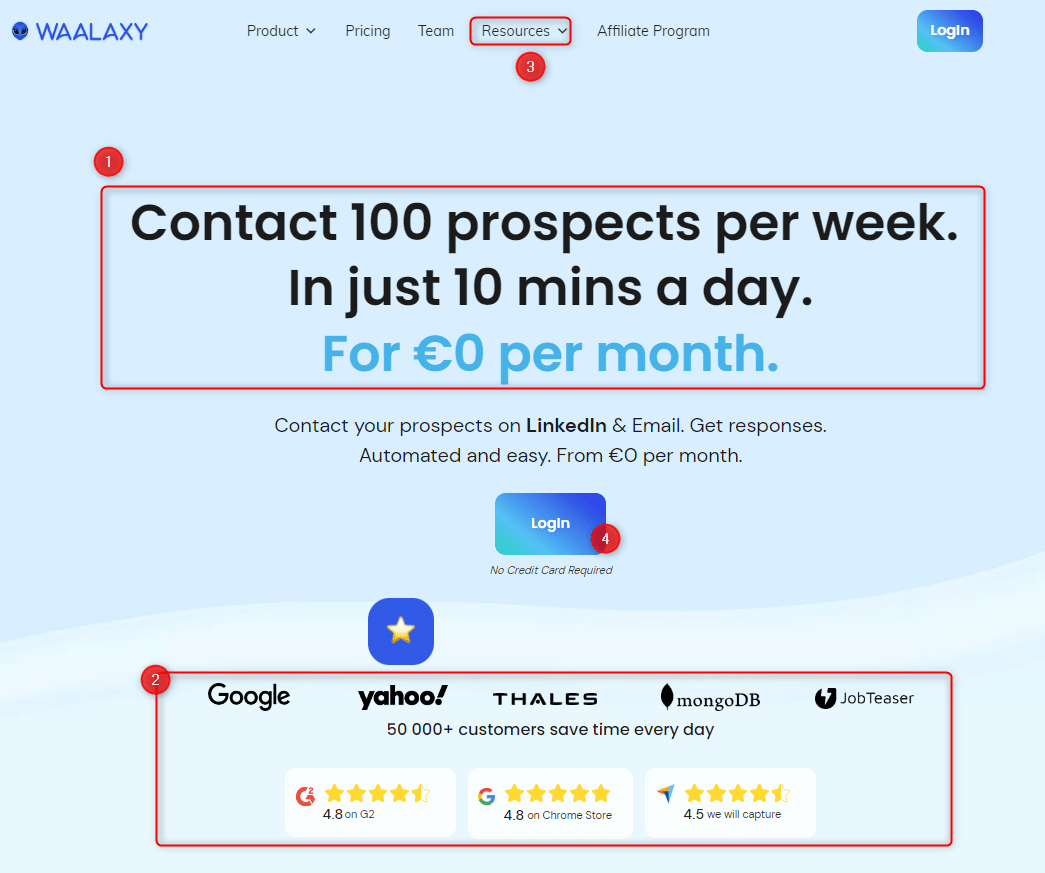
- The tagline quickly explains the value proposition of the tool.
- The reviews allow you to position yourself as an expert and inspire confidence.
- The resources are there to guide the user who needs to know more.
- The call to action helps create the purchase decision. (Step number 3. 👇)
3.The decision (or “buy mode”).
It’s time for marketing automation. In the “decision” phase, you need to turn a warm lead into a customer. He has passed the first two stages – he knows you exist, and he knows you are selling a solution that is interesting to him.
The best way to help him make his decision is to improve the UX – user experience. Of course, cookies must be validated beforehand. Make your site easy on the customer journey:
- Pre-populated payment information, already registered mailing address, saved shopping habits.
In addition to an optimized website, you can use other strategies to drive the purchase decision. 👇🏼
- An emailing campaign or a multichannel campaign.
- Follow-ups on social networks,
- Personalized coupons.
- LinkedIn messages.
This is the time when your technique is to encourage people who have shown an interest in your brand and your product to decide.
4. The retention
Now the prospect knows he wants to buy. To help them take action, use CTAs (call to action) in the right places on your landing or website.
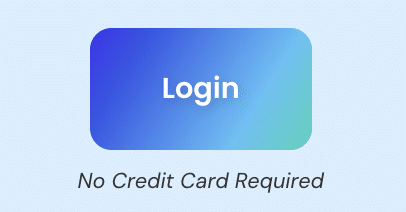
These CTAs can be different and should be placed all over your blog, in a fluid way, without assaulting the prospect.
- “Sign up for the newsletter”
- “Sign in”
- “Buy Now”
- “Try it out”
- “Learn more”
- ” Take advantage of the offer”
- “Discover the offer”
To improve your conversion rate, you can rely on several strategies:
- Exclusivity – “Create your own custom design”.
- Rarity – “Only 5 items left in stock”.
- Urgency. – Only today” “Offer valid until” “Only today”.
Why make a good sales funnel?
A sales funnel is a bit like a slide. That is, it will take a totally cold person fluidly and naturally to your paid offer.
However, the length and type of sales funnel depends on two main criterias: your market segmentation and the temperature of the prospect. 🔥
In other words, the metric that determines where your prospect is in the 3-step process seen earlier (awareness, consideration, decision).
Let’s take a look at a few situations where an automated sales funnel will be of great help to you…
To convert more leads and turn more customers
As said before, a sales funnel allows you to change a person’s phase. That is to say, their state:
- Visitor. 👇
- Prospect.👇
- Customer. ✅
For example, to convert more prospects, you can offer a free resource in exchange for the email address. Then redirect them to your paid offer after signing up to move from the “lead” phase to “customer”. ❤️
To sell your training offers
Creating an automated sales funnel is widely used in the infoproduct world. That is, in selling digital products like online training.
For example, some tools can help you create a sales funnel very easily. The most used are Systeme io and Clickfunnels.
Here is an example of how to create a sales funnel that you can output for your training offers:
- Capture page to harvest first name and email in exchange for a donated resource. 🎁
- Thank you page with a registration form for a webinar in your topic. ✍🏼
- Sales page that the user receives after the webinar. 📹
Then you send out a series of automated emails to promote your webinar. And you sell your training at the end of your webinar. 🚀
To sell products and services
If you sell products and services, you can also use the power of an automated sales funnel.
For example, if you are a consultant/freelancer as a graphic designer, it can help you get clients easily. Here’s how it can work with an example:
- You offer a digital book on “How to properly choose your logo identity?”.
- You harvest the email address in exchange for the digital book.
- You send automated emails with your designs, customer reviews, etc.
- You make a call to action at the end of the email to your Calendly page.
- You offer your services by video/telephone call.
The same is true for e-commerce sites. This is only an example for graphic designers. In the next part, we will see how to create its automated sales funnel no matter your theme. 🥰
How to create an expert sales funnel?
Follow these simple steps to create your sales machine, which converts without you having to spend too much time trying to convince your prospects to buy. 👇🏼
Step 1: Create a lead magnet
The first step is to find something to trade for your visitor’s contact information. Basically, his or her email address should be harvested.
But you can go further to personalize your relationship with the prospect during their lifecycle:
- First name.
- Phone number.
- Company name.
- Website.
- Your address.
- Etc.
There are many lead magnets you can offer your visitors, remember to always work on copywriting and have a catchy title. Here are some ideas: ⬇️
- Free consultation.
- Discount coupon.
- Checklist.
- Quizzes.
- Video.
- Video series.
- Toolbox.
- Calendar. 🗓️
- Podcast.
- Interview.
- Live demo.
- Admission ticket.
- Email training.
- Physical product.
- Swipe file.
- Computer graphics.
- Phone call. 📞
- Audit.
- Price estimate.
- White paper.
- Digital book.
- T-shirt. 👕
- Statistical data.
- Case study.
- Explanatory guide.
- Downloadable PDF.
- Webinar.
- Online training.
Find your prospect’s #1 pain and partially respond with your lead magnet.
For example :
👉🏼 If you have an e-commerce site, offer a discount coupon because the primary pain is spending too much.
👉🏼 If you are a web agency, offer an audit of your prospect on their digital marketing strategy. 🎁
👉🏼 If you are an SEO consultant, offer a free 20-min consultation to ask questions about the issues your prospect is facing.
The purpose of a lead magnet: to create a first step of conversion between a visitor and a person with a need. The following steps will allow you to fill this need.
Step 2: Create a calling offer
A calling offer is something your customer will have a hard time turning down because it’s so irresistible to them. 👀
- It’s an offer that has a real value proposition.
- It is an offer that is not expensive (under €50).
It can be, for example:
- An inexpensive physical product (the case of e-commerce).
- A video training (the case of info-preneurship).
- A marketing automation tool.
- A paid digital book.
- A premium content.
The goal is to turn the prospect into a customer as quickly as possible to get them to the “customer” state. Then, you will be able to upgrade your customer. That’s what we’re going to see right now! 😎
Step 3: Create a Flagship Offer
Your flagship offer is your main product/service. Very often, you’ll notice that when you sell a flagship product to people, they’ll want to go further. That’s why you can offer a fairly standard service to meet their need. This can be 👇🏼
- A manual service.
- A long video training.
- A CRM or marketing automation software.
- A coaching.
The goal of your flagship offer is to manage to qualify your file of previous buyers to identify the most hyperactive ones. This way, you offer them even more value.
But you’ll find that if you apply this in your automated sales funnel, some people will want to go even further…
Step 4: Create a premium offer
And this is where the premium offer comes in. That is, a custom offer very often charged by performance instead of time or unit. 📊
For example, this could be:
👉🏼 A 6-month accompaniment with one coaching per week and one report per month.
👉🏼 Private coaching until you reach your goal.
The advantage of this offer is that you will be able to help the person change their lives since you will be paid “classically” as well as at a premium if you achieve the result set by the client.
Here is an example with a lead generation consultant who wants to help a web marketing company to find more customers.
The objective and KPI could be: sign 30 clients in the next quarter. The price of the support could be €1500/month + €5000 bonus if the objective is exceeded.
Obviously, it is difficult to automate the buying decision process for a high-end offer. You need to understand the person’s needs, propose solutions and set results your offer. 🥰
But if you want to save time, you can still automate part of the sales process. ⏲️
Step 5: Sales funnel and automation
You’ll be able to automate the descent of customers through this sales funnel thanks to inbound marketing :
- Your lead magnet.
- Your calling offer.
- Your flagship offer.
- Your premium offer.
- Your sales page.
For this, you will be able to use tools like Systeme io, Clickfunnels, OptimizePress, Podia, and many others.
Some of them are paid, others are free. But they are easy to use, they are usually Swiss Army knives 🔪 in creating an automated sales funnel.
👇🏼 Not to be confused with (check out our dedicated article to understand the difference):
Let’s take a look at how you too can launch your sales funnel today, even with little starting money.
How to create a free sales funnel?
Once you have taken care of your sales funnel, you need to take care of the marketing strategy part. The goal: to create the desire to buy your products and services and make a comfortable living.
Create an account on Systeme io
Systeme.io is a software for creating sales funnels, and offers a freemium version. With the free version, you can, for example:
- Collect up to 2000 contacts.
- Send unlimited emails.
- Create 3 online sales funnels of 10 pages max.
- Create 1 blog with your domain name.
- Publish blog articles and work on your SEO (to appear in the first results of the search engine used by the Internet user)
- Have a member space secured by password.
- Have as many members as you want inside.
- Store unlimited files.
- Automate a minimum of your actions.
- Create 1 automated scenario.
- Do A/B tests.
- Create coupons.
- Use social networks to promote your irresistible offers 😉
- Create upsells, down sells and order bumps.
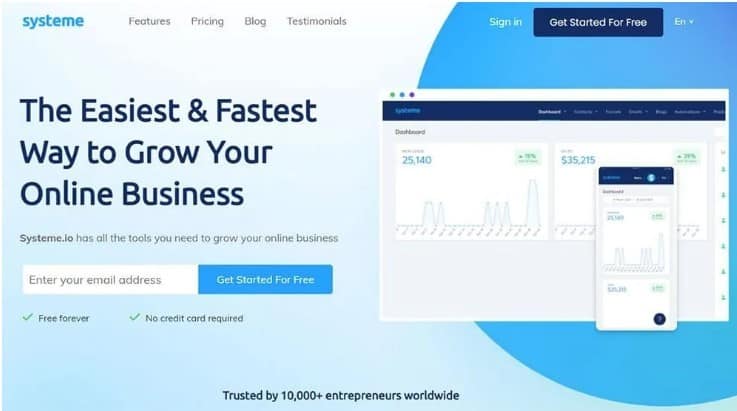
In short, you have seen the huge possibility you have with the free version of this software. It’s all you need to start your sales funnel.
You can also choose to boost your online sales with paid advertising like Google Adwords or LinkedIn Ads. Now here’s how to take action! 🚀
Create the customer journey step by step
Once you’ve created your free account, you can start creating your marketing sales funnel:
- The first step is to build your capture page, i.e. the landing page that will allow you to collect essential information from your prospects (email address at least).
- The second step is to create your sales page. This is the main landing page of your online business. It allows you to sell your product or service.
How do you create a great capture page to convert as many visitors as possible into leads?
Here are some steps to create a great capture page. 👇
Understand the pain of the prospect
The first step is to understand your prospects‘ pain points.
- What are their biggest conscious frustrations?
- What are the deep pains of their conscious frustrations?
- Why are they unhappy customers?
It’s important to go deep into the research of the need.
For example, if you are in the real estate online training business. The biggest conscious frustration is not making more money to do more things. Look for the frustration behind that. 🤔
Often, it’s the lack of freedom behind it.
For example, in weight loss, the potential client’s conscious frustration is being overweight. Ask yourself: Why? What is the root of this problem? Here, it is often the gaze of others that is the deep pain. 👀
Understand your prospects’ pain and put it front and center on the capture page.
Create the structure of the capture page
Use the A.I.D.A method structure learned earlier in this article and start with a powerful hook that highlights the conscious frustration and deep pain, writing a sub-hook with the person’s desire. 🔥
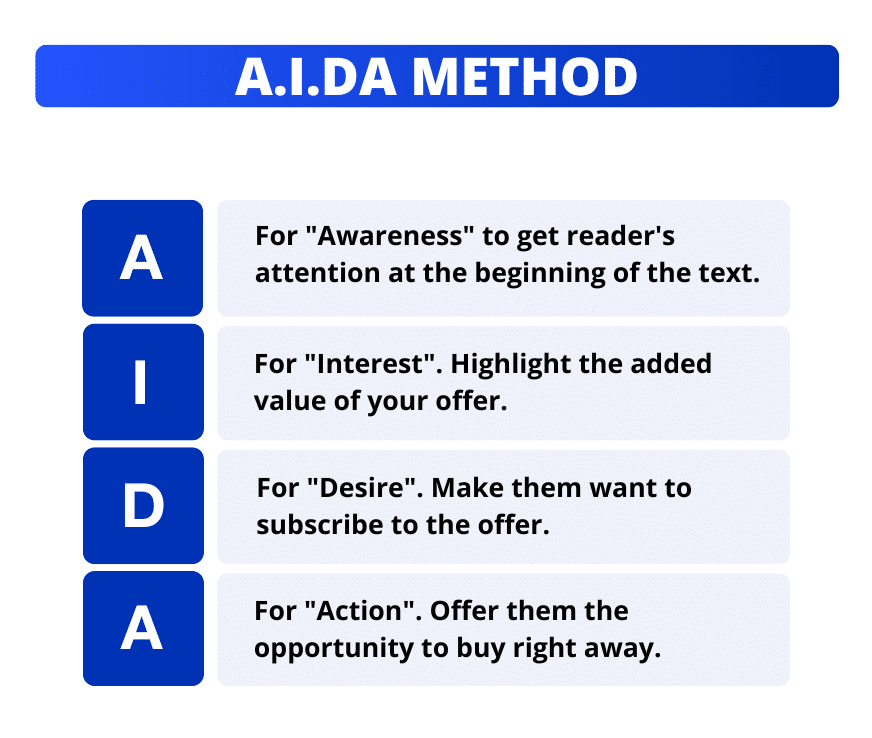
Then, do a little writing to make the person fully feel like it’s about them. This can be pressing on the issues, or telling a small story. 📚
Next, back up the benefits of your offer. To do this, start by stating the benefits and connecting them with the features, and add the meaning afterwards (which touches on deep desires).
An example : “Learn how to create a profitable blog that pays you even when you’re not working, with the ABC method, which will allow you to be free to earn as much money as you want, from wherever you want without working more than 2 hours a week.”
How do you create a sales page that sells your products and services massively?
For the capture page, it’s not much different, except you’re going to go a little further. That is, you’re going to focus your message on your customers’ results and their testimonials. You can use Robert Cialdini‘s 6 principles of influence to maximize the persuasive power of your sales page:
- The principle of reciprocity (the more you offer, the more you receive).
- The principle of consistency (a small commitment creates an inertia of commitment).
- The principle of social proof (other people have taken action).
- The principle of authority (authority figures trusted me, results).
- The principle of sympathy (the human side of your offer).
- The rarity principle (limited and exclusive edition).
Work on and add these elements into your sales page for your product and service.
Test the automated sales funnel
Once you have your sales funnel in place, you will need to test it. Remember one thing:
The market is always right.
It’s possible that your offers won’t work. In fact, the first mistake entrepreneurs make is trying to create something according to their desires instead of designing an offer that meets a market need. 💰
Metrics for a capture page
The conversion rate of your capture page will depend almost entirely: on your offer and your copywriting. Web design plays into conversion, especially in the B2B environment. Here are some numbers:
- Excellent conversion rate: >45%. 💰💰💰
- Average conversion rate: 10-45%. 💰💰
- Low conversion rate: <10%. 💰
In the B2C market a little less, but the graphic design of your sales page will still have to be drinkable.
Metrics for a payment page
Here are some figures for a payment page:
- Excellent conversion rate: >65%. 💰💰💰
- Average conversion rate: 20-65%. 💰💰
- Low conversion rate: <10%. 💰
💡 Place testimonials and all types of elements that can reassure the prospect.
How to calculate your sales funnel
Now we’ll look at how to calculate the profitability of your sales funnels.
This will allow you to know if your automated sales funnel deserves to be optimized, or flocked by advertising.
Let’s start with a very important term to understand, customer acquisition cost! ⬇️
Calculate the customer acquisition cost (CAC)
The CAC is the financial amount it costs you, on average, in promotion to get 1 customer. For example, if you spend €17 in Google Ads to get a sale, then your CAC is 17.
You got it: it’s essential for your business to reduce your CAC as much as possible to increase your profitability, and it complements with the next very important metric, which is. 👇🏼
LTV (or customer lifetime value) is the financial amount of money that a customer brings you on average, over the course of their customer cycle.
To give you an example: if a customer brings you €400 in sales over several months/years, the LTV is 400.
This is the total amount of money your customer has brought in. Unlike your CAC, your LTV must be as high as possible to ensure the profitability of your business.
But now how do you know if you are profitable? That’s what we’ll see right away. 👌
Calculate the ROI and optimize it
The return on investment (ROI) is a metric that ensures the profitability of an action. If the ROI is greater than 1, it’s profitable. If it’s less than 1, it’s not profitable.
And to calculate it nothing is simpler: ROI = LTV/CAC.
Let’s take an example. You have an average CAC of 88€. And the average LTV is 274€. Your ROI is therefore: 274/88 = 3.11. This means that for 1€ invested in your promotion, 3.11€ will come out at the end. You have made 2.11€ of gross margin per euro invested.
And in your automated sales funnel, try to pay attention to how much you invest at the entrance to get people into the marketing sales funnel, and how much you get back at the exit.
Make the ROI as high as possible, and optimize each step of the sales funnel to elevate your ROI. 🛠
Use Waalaxy to optimize the performance of your automated sales funnel
Waalaxy, our B2B LinkedIn prospecting and emailing automation tool, will help you put in people at the entrance of your sales funnel, at a lower cost.💰
In fact, Waalaxy has a free version for you to use the tool serenely.

You will be able to :
- Send mass invitations in automatic to targeted people. 🎯
- Send a series of automated messages to promote your sales and capture page. 📈
- Strengthen your database of contacts. 📚
- Make more sales. 🤑
Unlike other tools, Waalaxy does not limit you in the number of invitations you can send each day. And it’s totally secure.
You can choose from over 12 automated sequences to get you started getting people into your sales funnel. 🔥
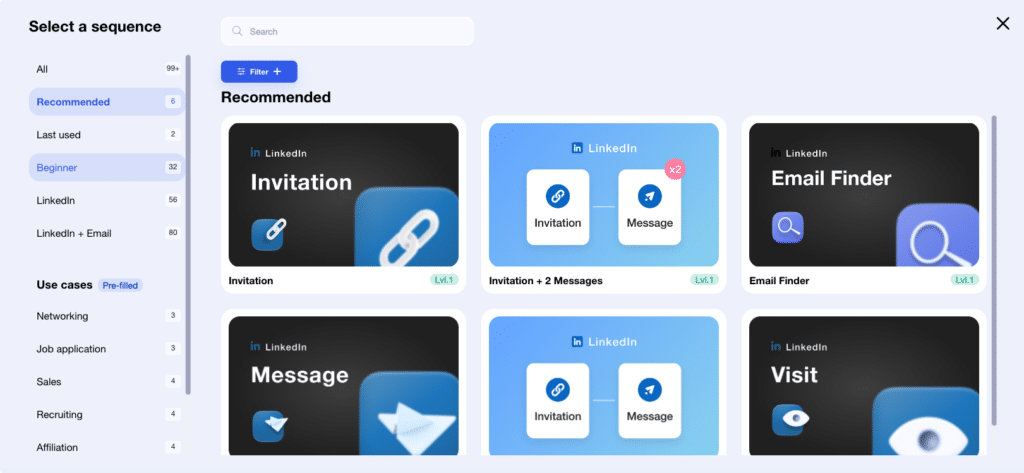
Conclusion – What is a sales funnel?
Today, in this article, you have discovered the following points:
- What is a marketing sales funnel?
- How does an automated sales funnel work?
- Why make a sales funnel?
- How to create an expert sales funnel?
- How to calculate it?
- Using a marketing automation tool, aka Waalaxy, to optimize your performance.
Frequently asked questions
What is the best sales funnel?
This question is quite tricky because, depending on your goals and needs, the choice of software for creating a sales funnel can vary. In this article, we introduced you to Systeme.io but, you can use Clickfunnels, OptimizePress or well Podia. 🥰
How to make a marketing sales funnel?
We explained it above but, here are the key steps 🗝️ to make a funnel:
- Work on your buyer personas,
- Create high value-added content,
- Promote your content,
- Create freemium and premium content offers,
- Optimize your website’s SEO and SEA,
- Create conversion funnels.
What is systeme.IO?
As said before, this SaaS B2b software is a tool that brings together all the necessary tools to create a website and develop an online business. 🌐
There you go, now you know how to create and promote your sales page, and create an automated Sales Funnel with Waalaxy. We don’t have to teach you anything more, all you have to do is get started. 🚀



